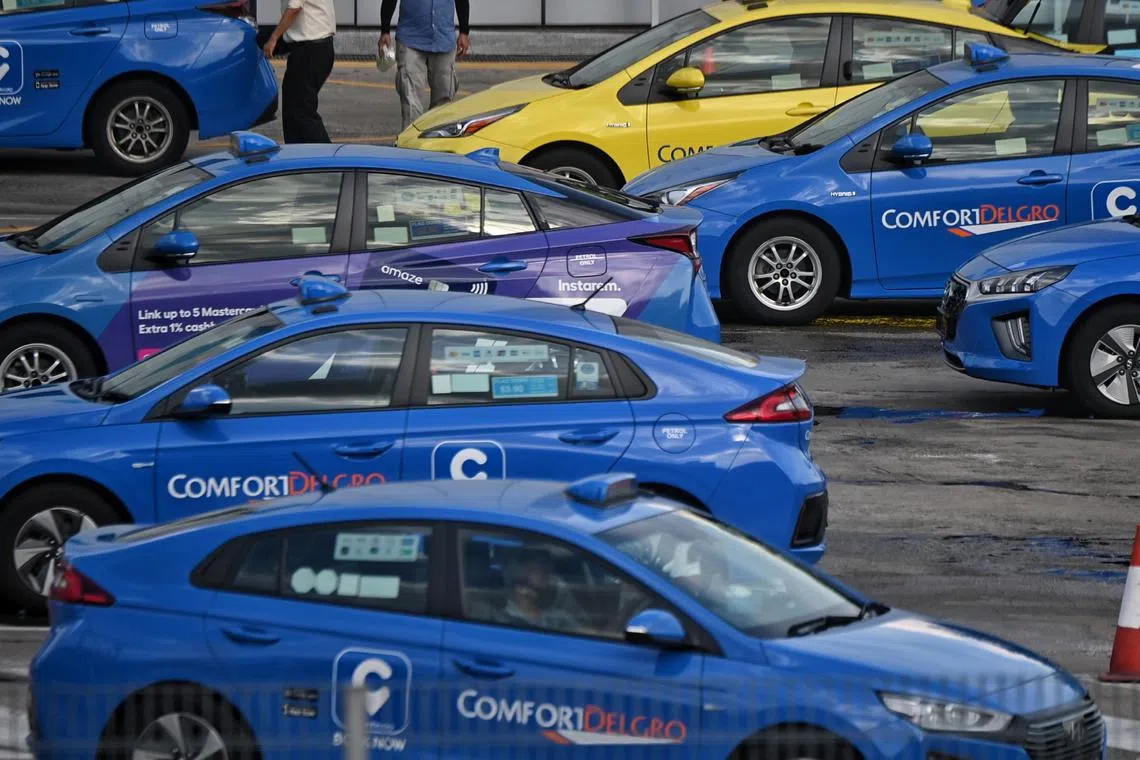ComfortDelGro to buy up to 1,000 new hybrid taxis to replace diesel cabs
Sign up now: Get ST's newsletters delivered to your inbox

ComfortDelGro’s planned purchase of new hybrid taxis comes as its push towards fully electric vehicles has slowed.
PHOTO: ST FILE
Follow topic:
SINGAPORE – ComfortDelGro is looking to put up to 1,000 new petrol-electric hybrid taxis on the roads here as the taxi giant continues to move away from diesel-powered vehicles towards more environmentally sustainable alternatives.
The listed transport group, which owns the Comfort and CityCab taxi brands, called a tender last Thursday for the supply of 500 new hybrid taxis that are expected to be delivered and ready for use from Nov 1.
The tender, which closes on May 12, also comes with an option for another 500 hybrid taxis, with delivery no later than October 2025.
If exercised, this option would take the total order to 1,000 hybrid taxis, equivalent to about 11 per cent of ComfortDelGro’s current fleet of 8,700 cabs.
According to documents seen by The Straits Times, both authorised car dealers and parallel importers are eligible to bid for the tender, and the contract may be awarded to one or multiple suppliers.
In response to queries, Ms Tammy Tan, group chief corporate affairs officer of ComfortDelGro, said the company’s latest order of hybrid cabs is to replace diesel-powered Hyundai i40 taxis that will reach the end of their lives in 2024.
The statutory lifespan for diesel and hybrid taxis is eight years. For electric taxis, it is 10 years.
The Hyundai i40 entered ComfortDelGro’s ranks in 2013, and it is the oldest taxi model the company offers for hire.
It was followed by the Toyota Prius petrol-electric hybrid – the company’s first non-diesel taxi – and the Hyundai Ioniq hybrid, which the company started rolling out in 2017.
In recent years, ComfortDelGro has been buying hybrid taxis in bulk to reduce its carbon footprint.
The company did not give figures when asked by ST, but Land Transport Authority records show that hybrid taxis now make up the large majority of cabs across the industry here.
As at the end of February, there were 9,635 petrol-electric hybrid taxis, accounting for about 69 per cent of Singapore’s taxi fleet. This was up from 5,646 hybrid cabs in February 2019.
The number of diesel taxis has fallen sharply over the same period, in line with an overall drop in the total number of cabs from about 20,000 in 2019 to less than 14,000 now.
There were 3,912 diesel cabs as at the end of February, compared with 14,454 four years ago.
ComfortDelGro’s planned purchase of new hybrid taxis comes as its push towards fully electric vehicles has slowed.
There were plans to put up to 400 BYD e6 electric taxis
While the company has 102 BYD e6 taxis in use now,
Ms Tan said: “With DC chargers, an e-taxi can charge up from 20 per cent to 80 per cent in 45 minutes, as opposed to seven hours with the slower alternating current chargers. This will help to mitigate charging downtime and range anxiety.”
She added: “Should hirers choose to upgrade their diesel taxis to electric ones, we will provide them with the electric option.”
As a whole, the taxi industry in Singapore had previously committed to having at least half of the cabs here run on batteries by 2030.
This is in line with the Government’s aim of having all vehicles running on cleaner energy by 2040.


